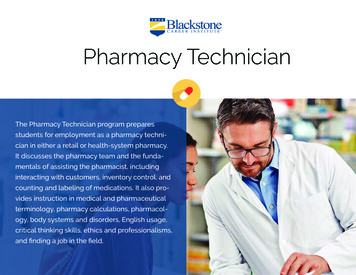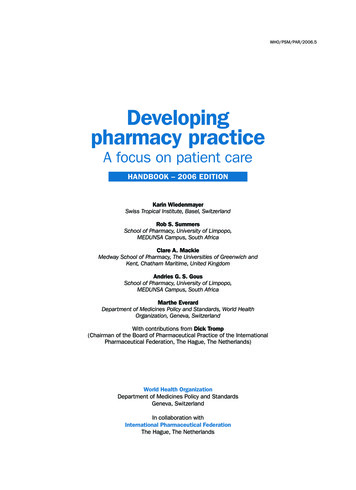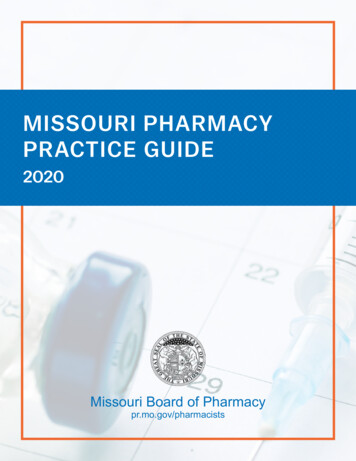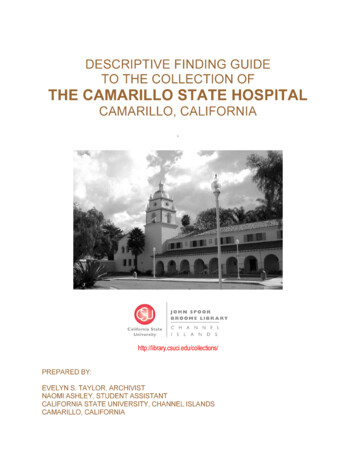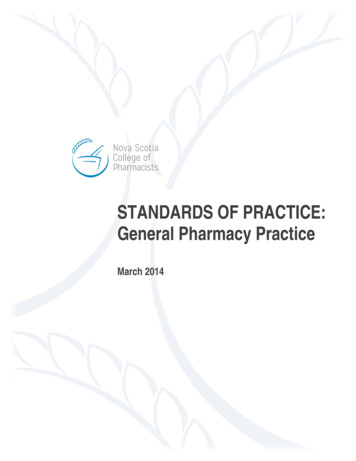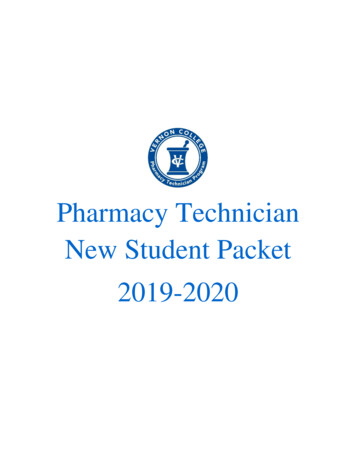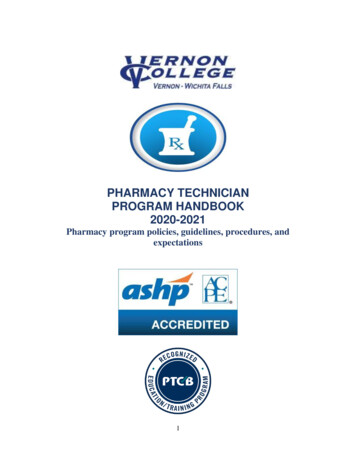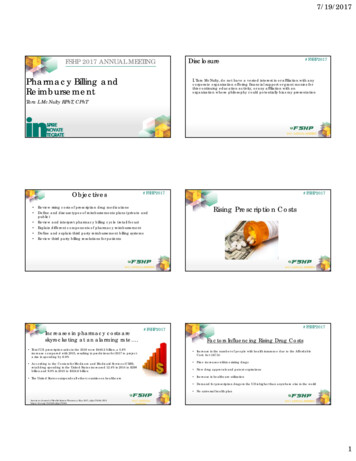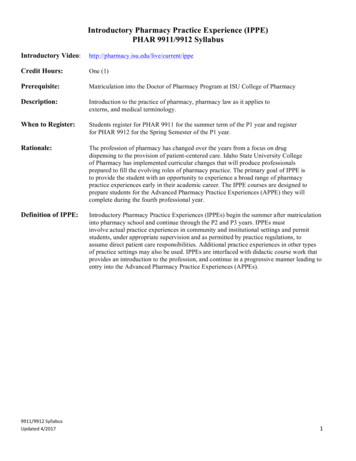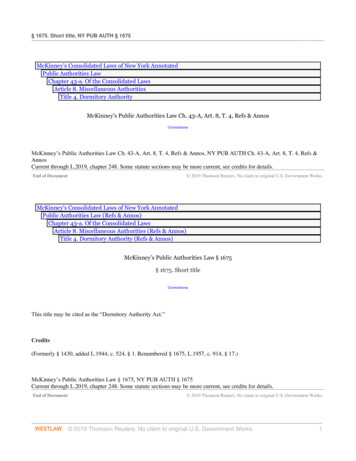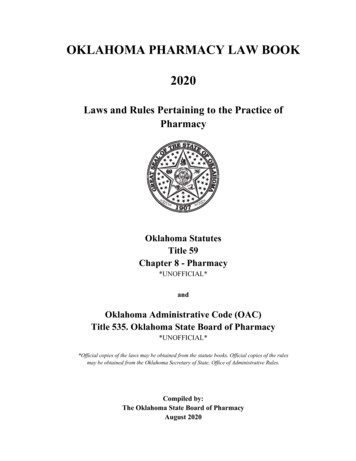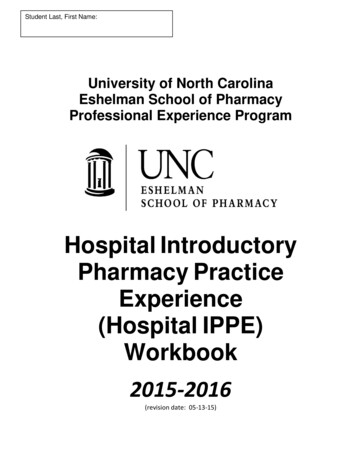
Transcription
Student Last, First Name:University of North CarolinaEshelman School of PharmacyProfessional Experience ProgramHospital IntroductoryPharmacy PracticeExperience(Hospital IPPE)Workbook2015-2016(revision date: 05-13-15)
TABLE OF CONTENTSSyllabus . 1Faculty/Staff Directory. 5Participating Hospitals . 6Overview of Goals . 7Calendar of Activities . 8(1) Medication Dispensing (Non IV)Section Overview. 9Required Activity Checklist. 9Practice Exercises . 11(2) Medication Dispensing (IV)Section Overview. 16Required Activity Checklist. 16Practice Exercises . 17(3) Pharmacy AdministrationSection Overview. 22Required Activity Checklist. 23Practice Exercises . 24(4) Communication and Professionalism ActivitiesSection Overview. 26Required Activity Checklist. 27Sample Patient History Interview Forms. 28Drug Information Documentation Form (4 copies) . 31Summary of Assigned Readings and Topic Discussions . 39Summary of Reflective Essay . 40Reflective Essay Rubric . 41Preceptor’s Evaluation of Student Performance . 42
SYLLABUSPRECEPTOR/SITE INFORMATIONStudents may use RxPreceptor for preceptor and site contact information.CAMPUS FACULTYPhilip Rodgers, PharmD, FCCPAssistant Dean of Pharmacy Practice PartnershipsOffice: UNC Eshelman School of Pharmacy, CB# 7566, Beard 109L, Chapel Hill, NC27599 Telephone: 919-966-1705Fax: 919-966-9730Email: prodgers@unc.eduOffice Hours: by appointmentKim Leadon, M.Ed.Director, Office of Experiential Education (OEE)Office: UNC Eshelman School of Pharmacy, CB# 7566, Beard 109F, Chapel Hill, NC27599 Telephone: 919-966-3023Fax: 919-966-9730Email: kim leadon@unc.edu Office Hours:by appointmentCOURSE CREDIT AND EXPERIENTIAL HOURS4.5 credit hours and 160 experiential hoursCOURSE SECTION NUMBERSection 956COURSE DESCRIPTIONThe primary intent of the Hospital IPPE is to facilitate students’ continuing professional development in thecontext of the hospital pharmacy practice setting. Through structured activities and assignments, studentswill build upon knowledge and skills developed in the first year of the didactic curriculum. Students willcontinue to explore the concepts of professionalism and shared accountabilities for health care outcomes;formulate a personal philosophy of and approach to professional practice; expand drug and diseaseknowledge; and develop practical, critical thinking and life-long learning skills. This experience seeks toprovide students with direct exposure to the dynamics of the hospital pharmacy workplace and to guidethem to a realistic assessment of the challenges and opportunities that exist therein.PREREQUISITESStudents must complete and receive a passing grade in all PY1 courses including the Calculations Course.Non-passing course grades must be resolved before the student may progress to practice experiences.DESCRIPTION OF TEACHING/LEARNING METHODS Experiential learning: applying knowledge, skills and attitudes learned in the classroom to patientcare practice. Self-directed learning: students will engage with course content by independent work andselected course assignments.RECOMMENDED LEARNING RESOURCES Students must have internet access and a UNC email account The Experiential Education Manual available on the school’s website nmanual.nd Nemire R. and Kier K. Pharmacy Student Survival Guide, 2 edition, McGraw-Hill Companies, 2009,ISBN: 0-07-136195-2. “Understanding Pharmacy Calculations,” authored by Teresa O’Sullivan and Linda Stevens Albrecht. Pharmaceutical Calculations text by Ansel (required text for Pharmacy Calculations Course PHCY 203)3
REQUIRED MATERIALS Hospital IPPE workbook Director’s Forum book Short lab coat with UNC name badge RxPreceptor at www.rxpreceptor.com is the rotation management software system that will be usedby OEE to track all pharmacy rotations and associated information. Preceptors may require and/or recommend additional materials for their rotations. Students areexpected to communicate with the preceptor regarding such requirements prior to the rotationstart date.EXPECTATIONS FOR STUDENT ENGAGEMENT To receive full credit for this course, students are expected to attend and participate in all scheduledrotation activities; arrive on time; and remain until required activities have been completed or they aredismissed by their preceptor. It is expected that students will come to the rotation site with an openmind and respectful demeanor. Student preparedness for topic discussions, patient case discussions, etc. is a critical element in thiscourse. The faculty and staff consider the preceptor-student relationship as collegial and respectful. As moreexperienced, professional colleagues, preceptors generally view themselves as mentors in the student’sprofessional development. Students should expect preceptors to communicate expectations andinstructions clearly and concisely. Students should also expect preceptors to provide them withrelevant resources, activities, experiences and feedback to facilitate success in the curriculum and inpractice. Preceptors are fully committed to fulfilling this responsibility and will work to ensure that eachstudent has the opportunity to be successful. In return, preceptors expect students to behave in aprofessional, responsible, and ethical manner; demonstrate a positive attitude, enthusiasm for learning,and respect for themselves and others; be prepared for each session; be flexible and be accountablefor their assigned responsibilities.OFFICE OF EXPERIENTIAL EDUCATION AND SITE SPECIFIC POLICIESStudents and preceptors are expected to comply with the OEE policies and procedures published in theExperiential Education Manual at anual. Preceptors may require and/or recommend additional sitespecific policies for their rotations. Students are expected to communicate with the preceptor regardingsuch requirements prior to the rotation start date. Site specific forms and requirements may be listed forindividual sites in RxPreceptor.SPECIAL NEEDSThe UNC Eshelman School of Pharmacy is committed to providing reasonable accommodations for allpersons with documented disabilities or accessibility concerns in accordance with Section 504 of theRehabilitation Act of 1973 and the Americans with Disabilities Act of 1990. If you have a medical condition,disability, or accessibility concern that may impact your ability to meet the academic demands orrequirements of the course, please contact the appropriate office on your campus. Students are requiredto self-identify for disability/accessibility support. Chapel Hill based students, contact Accessibility Resources and Services in person at the Studentand Academic Services Building (SASB) Suite 2126, by email at accessibility@unc.edu or via theirwebsite at http://accessibility.unc.edu. Asheville based students, please contact Disability Services in person at 258 Brown Hall, by phoneat (828) 232-5050, or by email at disabilityservices@unca.edu.STUDENT ACTIVITIES AND ASSIGNMENTSStudents will work with preceptors to complete activities and assignments which will enable them toaccomplish the objectives by the end of the rotation. Preceptors may utilize a learning contract and rotationcalendar to organize the experience, to clearly communicate expectations, and to account for studentrequirements. Student projects are to be detailed by the preceptor, but it is expected that during the rotationthe student will complete the activities described in two of the 4 workbook sections and the relevant activitychecklists.4
WORKBOOK REQUIREMENTSStudents are required to complete only the items detailed below. Students hand in to OEE during the firstweek of the next semester the completed sections of the workbook.1. In collaboration with preceptor, students will complete 2 out of the 4 workbook sections listed below: Medication dispensing (non IV) Medication dispensing (IV) Pharmacy administration Communication and professionalism2. Students will complete all assigned readings detailed on page 39 of workbook. The preceptor will choosea minimum of 3 required readings to use as subject matter for topic discussions.3. Students will complete a reflective essay detailed on page 40 of workbook.LATE ASSIGNMENT POLICYAll assignments must be submitted by the designated deadline. Ramifications for late assignments will beat the discretion of the preceptor.ASSESSMENT AND GRADINGThe student will be assessed by the preceptor on performance and professionalism at the midpoint and atthe end of the rotation. Please see experiential course assessment tools at the end of the syllabus. Themidpoint evaluation will NOT be used in the calculation of the student’s grade however it will provide abasis for feedback regarding the student’s progress, including action items where necessary for the rest ofthe rotation. Additionally, it is the student’s responsibility to assure a midpoint evaluation is completed bythe preceptor. Within one week of rotation midpoint, students not receiving a midpoint evaluation that isdocumented in RxPreceptor should notify the Office of Experiential Education.Grading Scale: Honors: 93.0 - 100% Pass: 70.0 – 92.9% Fail: 70.0%GRADE ADJUSTMENT POLICYStudents who wish to appeal a rotation grade should follow the progression guidelines described rogression-c4c8REMEDIATION POLICYRemediation is not offered.INCOMPLETE GRADE POLICY Incomplete grades will be assigned when rotation assignments are not completed due to extenuatingcircumstances (i.e. prolonged illness, unexpected medical procedure required, family emergencies, etc.)but the student is capable/competent of passing the rotation. A preceptor should contact the Office ofExperiential Education before the conclusion of the rotation to notify of “incomplete” status andprovide rationale. Incomplete grades must be resolved within the first 8 weeks of the following semester. All incompletes must be resolved prior to being cleared for graduation.COURSE FAILURE A non-passing rotation grade will require a “make-up” rotation that is scheduled by the Office ofExperiential Education. A “make-up” rotation will be scheduled at a different practice site and with adifferent preceptor. The failing grade is not removed from the student’s transcript. Despite this course being Honors/Pass/Fail, a failing grade in this course will be incorporated in theGPA (4.5 hr credit).PRECEPTOR ASSESSMENT / EXPERIENTIAL COURSE EVALUATIONStudents are required to complete the course/rotation evaluation in RxPreceptor one week following thecompletion of the rotation. Those not completing the evaluation will receive an “incomplete” grade for thecourse/rotation. This is a course requirement and a responsibility of all students completing a course.Student feedback is essential and highly valued in the School’s efforts to continually improve the quality ofcourses and the effectiveness of our faculty as educators. As a faculty, we can assure you that yourfeedback is reviewed in detail. The evaluations are taken very seriously by course directors and the School.In 2011, the School implemented new policies and procedures for course evaluations, which include5
specific guidance on how the findings are used by the School as a means of continued qualityimprovement. More information about the policy and insight into how we use your feedback, can be sment/course-evaluations. Students not completing the rotation evaluation in RxPreceptor within oneweek following the completion of the rotation will receive an “incomplete” grade for the course/rotation. Allcourse evaluations are confidential and anonymous.ATTENDANCE POLICYPreceptors acknowledge that extenuating circumstances occasionally occur that prevent attendance duringrotation. At the discretion of the preceptor, an excused absence during one rotation period will be allowed aslong as the objectives of the rotation are met. Any unexcused absence during the course of a rotationmonth must be made up in a way that meets with the preceptor’s approval. Failure to make up missed workwill result in a grade of incomplete.Excused absences: Planned or unplanned absences are excused only under the following circumstances,which are beyond the control of the student: Medical necessity refers to unpredictable or serious illness of the student or an immediate familymember. Documentation, such as a physician letter, may be required at the request of thepreceptor. Routine medical or dental visits do not meet this criterion. Students should scheduleroutine medical or dental visits at the end of the day to avoid missing a full day of rotation. Bereavement Policy: An absence may be excused due to the death of a student's immediatefamily member (parent, child, spouse, grandparent, or sibling). Absences should not exceed a totalof 4 absences during the rotation month. Excused absences do not have to be made up; however,if the preceptor determines that the objectives of the rotation cannot be met as a result of theexcused absences, the student should work out a way to make up missed time at the preceptor'sconvenience. Participation in a pre-approved professional activity (i.e. activities of UNC SOP, local, state, ornational pharmacy organizations) constitutes an excused absence provided the student informsthe preceptor of the planned absence at the beginning of the rotation. Documentation of theprofessional activity is required. Work as an employee does NOT constitute participation in aprofessional activity. Other extenuating circumstances: The preceptor may, at his/her discretion, approve a request foran excused absence for other reasons. When possible, such requests should be made in writing atthe beginning of the practice experience.Unexcused absences are absences from rotation for any reason not listed above.Absence Notification Policy: The student must contact the preceptor of an anticipated absence asearly as possible prior to the absence. If circumstances prevent the student from providing priornotification, the student or his/her designate should contact the preceptor by phone first thing in themorning of the absence. Messages should include the student’s name, a brief summary of reason forabsence, and anticipated date of return. The preceptor will determine whether the absence is excusedor unexcused.PLAGIARISM AND REFERENCINGWe encourage you to use a variety of information resources to support your assignments, but you must givecredit for any and all ideas that are not originally your own. In addition to citing published works, youmust also reference any ideas derived from the Internet, lectures or seminars, or personal correspondence.More information on referencing can be found in the following journal article: Uniform Requirements forManuscripts Submitted to Biomedical Journals. NEJM 1997; 336(4): 99701233360422)ACADEMIC INTEGRITY / HONOR CODEThe principles of academic honesty, integrity, and responsible citizenship govern the performance of allacademic work and student conduct at the University as they have during the long life of thisinstitution. Your acceptance of enrollment in the University presupposes a commitment to the principlesembodied in the Code of Student Conduct and a respect for this most significant Carolina tradition. Yourparticipation in this course comes with the expectation that your work will be completed in full observance ofthe Honor Code. Academic dishonesty in any form is unacceptable. If a violation is suspected, it maybe reported to the Student Attorney General’s Office. If you have any questions about your responsibility orthe responsibility of faculty members under the Honor Code, please visit the Office of Student Conduct website (http://studentconduct.unc.edu), consult the Graduate and Professional Student Attorney General6
(gpsag@unc.edu), or contact a representative within the UNC Eshelman School of Pharmacy.SYLLABUS CHANGESIssues not addressed here or in other official course documents will be resolved according to the discretionof the preceptor. The course director or primary preceptor reserves the right to make changes to thesyllabus, including project due dates and test dates, when unforeseen circumstances occur. Thesechanges will be announced as early as possible so that students can adjust their schedules.7
UNC ESHELMAN SCHOOL OF PHARMACYPROFESSIONAL EXPERIENCE PROGRAMFACULTY/STAFF DIRECTORYOffice of Experiential EducationRegional Pharmacy FacultyPhilip T. Rodgers, PharmD, FCCPAssistant Dean of Pharmacy PracticePartnerships and Clinical Associate prodgers@unc.eduArea L AHEC - Debby Futrelldebby.futrell@arealahec.orgDuke Region – Kristen Campbellk.campbell@duke.eduCharlotte AHEC – Josh GuffeyWilliam.Guffey@carolinashealthcare.orgKim Leadon, M.EdDirector and Clinical Assistant ProfessorOffice:919/966-3023Email:kim leadon@unc.eduEastern AHEC - Dionne Knappknappd@ecu.eduCharlene WilliamsRegional Director of Experiential EducationOffice:828/250-3906Email:charlene williams@unc.eduMountain AHEC – Bill Hitchbill.hitch@mahec.netPam JacksonAdministrative SpecialistOffice:919/966-8619Email:pam Jackson@unc.eduSouthern Regional AHEC – Susan MillerSusan.miller@sr-ahec.orgPeyton LombardiCompliance SpecialistOffice:919/843-0256Email:peyton lombardi@unc.eduGreensboro AHEC - Peter Kovalpeter.koval@conehealth.comNorthwest Region – Kim Leadonkim leadon@unc.eduSoutheast Region – Kim Leadonkim leadon@unc.eduUNC Region – Ian Willoughbyiwilloug@unch.unc.eduWake Region – Ryan TabisRTABIS@wakemed.orgThank you to our team of workbook editors:Heidi Anksorus & Stephanie Kujawski5
North Carolina Hospitals Participating inUNC’s Hospital IPPE Program 2015Alamance Regional Medical CenterAngel Medical CenterBlue Ridge Healthcare – MorgantonBrunswick Medical CenterCape Fear Valley Medical CenterCarolinaEast Medical CenterCarolinas Medical CenterCarteret General HospitalCatawba Valley Medical CenterCentral Carolina HospitalCentral Regional Hospital – ButnerChatham HospitalCMC UnionColumbus Regional Healthcare SystemDavis Regional Medical CenterDuke Raleigh HospitalDuke University HospitalFirstHealth Moore Regional HospitalHaywood Regional HospitalHugh Chatham Memorial HospitalJohnston Health-Smithfield LenoirMemorial Hospital McDowellHospitalMatthews Medical CenterMission HospitalsMorehead Memorial HospitalMoses Cone HospitalNash General HospitalNorthern Hospital of Surry CountyPardee Memorial HospitalPender Memorial HospitalPerson Memorial HospitalRutherford HospitalSandhills Regional Medical CenterSelect HospitalStanly Regional Medical CenterThomasville Medical CenterTransylvania Regional HospitalUNC HospitalsV.A. Medical Center - FayettevilleV.A. Medical Center - SalisburyVidant Chowan HospitalVidant Medical CenterWakeMed Cary HospitalWakeMed Raleigh HospitalWayne Memorial HospitalWesley Long HospitalWilkes Regional Medical CenterWilson Medical Center6
OVERVIEW OF GOALS THE STUDENT SHOULD SPEND THE MAJORITY OF THEIR TIME IN THE INPATIENT PHARMACYLEARNING THE ROLES AND RESPONSIBILITIES OF EVERY STAFF MEMBER. THIS IS A MEDICATIONUSE PROCESS AND SYSTEMS BASED EXPERIENCE, NOT A CLINICAL EXPERIENCE.STUDENTS SHOULD BE ENCOURAGED TO WORK WITH PHARMACY TECHNICIANS, INCLUDINGTHOSE RESPONSIBLE FOR PURCHASING, FILLING MEDICATION DISPENSING MACHINES, AS WELLAS THOSE IN SATELLITE LOCATIONS.PLEASE TAILOR ANY ADDITIONAL DISCUSSIONS TO DEVELOPING THE STUDENT UNDERSTANDINGOF THE MEDICATION USE PROCESS IN THE HOSPITAL.The primary intent of the Hospital IPPE is to facilitate students’ continuing professional developmentin the context of the hospital pharmacy practice setting. Through structured activities andassignments, students will build upon knowledge and skills developed in the first year of the didacticcurriculum. Students will continue to explore the concepts of professionalism and sharedaccountabilities for health care outcomes; formulate a personal philosophy of and approach toprofessional practice; expand drug and disease knowledge; and develop practical, critical thinkingand life-long learning skills. This experience seeks to provide students with direct exposure to thedynamics of the hospital pharmacy workplace and to guide them to a realistic assessment of thechallenges and opportunities that exist therein.Activities of the hospital IPPE focus on clarifying distinguishing characteristics of hospital pharmacypractice and developing fundamental skills necessary to practice effectively in the hospitalpharmacy setting. This workbook will supplement the student’s learning during this month-longpractice experience. An answer key is not provided, as most of the workbook questions areinstitution-specific. Hospital Pharmacy Director’s Forum is a required book for the Hospital IPPE.All students will receive a copy and all hospital IPPE preceptors will receive a copy in the mail alongwith a copy of the workbook. Some of the required readings are from this book.This experience will emphasize the following goals:1.Preparation & Dispensing of Medications: Assist in the preparation and dispensing ofcontrolled and non-controlled medications, under the direct supervision of a pharmacist,following existing standards of practice and the health system’s policies and procedures.2.Preparation & Dispensing of IV Medications: Assist in the preparation and dispensing ofintravenous medications, under the direct supervision of a pharmacist, following existingstandards of practice and the health system’s policies and procedures.3.Pharmacy Administration: Demonstrate an understanding of the organizational structureand role of the pharmacy department as well as the activities of pharmacy personnel inmedication management and patient safety.4.Communication and Professionalism: Demonstrate the ability to interact verbally and inwriting with healthcare providers and patients by gathering, organizing, and appropriatelyrecording information and by consulting and counseling. Take personal responsibility forattaining excellence in one’s own ability to provide pharmaceutical care. Demonstratemature and professional attitudes, habits and behaviors. Utilize the available primary,secondary, and tertiary references on site to respond to drug information questions.7
Hospital IPPE - Sample Calendar of ActivitiesWeek 1FOCUS: Distributionprocess/order entryAMAMAMAMAMOrientation to pharmacy, staff,and hospitalDiscuss goals and objectivesfor clerkship; set clearexpectationsCS dispensingAssist in filing automateddispensing equipmentCS dispensingAssist in filling automateddispensing equipmentActivity timePMPMPMPMControlled substance (CS)dispensing – work with techand/or pharmacistWork with tech/pharmacistfilling automated dispensingequipmentWork with a tech deliveringmedications/IVsPMOrder entryOrder entryOrder entry/ check cartsOrder entry/check cartsAMAMAMAMAMWeek 2Order entryWork with RN – observe medpassWork with purchasing personOrder entryDo medication histories and/ordischarge counselingActivity timeIntro to IVs – watch aseptictechnique video and/or reviewpolicies and proceduresFOCUS: Distributionprocess, medicationmanagementPMReview aseptic techniqueagain; practice on expiredIVsDo medicationhistories/dischargecounselingPMCheck cartsDiscussion with Director ofPharmacy about philosophy ofdepartment, role ofdepartment in the institutionCheck cartsCheck for expired medicationsin pharmacy or on nursing unitWork with person who doespharmacy personnelschedulingPMDiscuss with pharmacist thestandards of USP 797 cleanroomDiscuss with pharmacistprocess of determiningcompatibility and stabilityPMDiscuss withpharmacist/director aboutfunction of P&T Committeeand formulary systemDo medicationhistories/discharge counselingPMMidpoint evaluationActivity timeAMAMAMAMAMWeek 3IV RoomIV RoomP&T CommitteeIV RoomIV RoomIV RoomFOCUS: IV TherapyPMPMPMActivity timeDeliver IVs with techPMPMDeliver IVs with techActivity timeDeliver IVsWork with IV pharmacist onTPN and chemo calculationsand preparationAMAMAMAMAMOrder entryReview contents of crash cartwith a pharmacistDischarge counseling and/ormedication historiesActivity timeInfection Control meeting withDirector of PharmacyActivity timePMPMPMPMWeek 4FOCUS:PharmacyadministrationPMDiscuss with pharmacist thefunction of JCAHO andmedication standardsPharmacy staff meetingNew drug presentation topharmacy staffDiscuss with director orpharmacist the role ofpharmaceutical reps in thefacilityActivity timeFinal EvaluationConsider having student work a night/evening shift and a weekend to see differences in work flow8
Medication Dispensing (Non IV)Section Overview:The primary intent of the Hospital IPPE is to facilitate students’ continuing professional developmentin the context of the hospital pharmacy practice setting. Throughout the IPPE, students will buildupon knowledge and skills developed in the first year of the didactic curriculum, drawing upon thoseexperiences to develop their understanding of the medication use process, focusing specifically ondispensing. Students will take part in the shared accountability for health care outcomes, formulatea personal philosophy of and approach to professional practice, expand their drug and diseaseknowledge, and ultimately promote patient safety.1. Non-IV Medications: Assist in the preparation and dispensing of controlled and noncontrolled medications, under the direct supervision of a pharmacist, following existingstandards of practice and the health system’s policies and procedures. Upon completingthis rotation, students should be able to describe / discuss the following: The medication use process at the practice site Inventory control, purchasing procedures, and storage for controlled and noncontrolled medications in the hospital setting The management of a hospital’s formulary and how non-formulary requests,including patients’ personal medications, are addressed Strategies used by hospitals to assess drug utilization and handle drug shortageswithin the confines of legal requirements The process of dispensing controlled and non-controlled medications in aninstitutional setting following the health system’s policies and procedures The appropriateness of a medication order with the pharmacist while learning thesteps of order verification The process for disposing of expired controlled and noncontrolled medications How technology/automation assists in the medication use processREQUIRED ACTIVITY CHECKLIST: Preparation and Dispensing of Non-IV MedicationsNote to preceptor: Students should have considerable exposure to this area of pharmacy practiceduring the practice experience. This exposure should include “hands on” participation whenpossible. These activities should be performed in patient care areas and pharmacy satellitelocations in addition to the central pharmacy, if applicable. Students should be encouraged to workwith pharmacy technicians when performing most of these activities.Non-IV Medications(40 hours is recommended to meet the above objectives and required activities;preceptor may reduce number of hours if student has been employed as a pharmacytechnician in a hospital inpatient pharmacy for at least 300 hours).Assessment:Preceptor SignOff w/initial anddateIdentify and list the components of the medical record. As available at your institution,take time to familiarize yourself with both paper and electronic charts.9
Order Entry and VerificationDiscuss computerized p
Nemire R. and Kier K. Pharmacy Student Survival Guide, 2nd edition, McGraw-Hill Companies, 2009, ISBN: 0-07-136195-2. “Understanding Pharmacy Calculations,” authored by Teresa O’Sullivan and Linda Stevens Albrecht. Pharmaceutical Calculations text by Ansel
